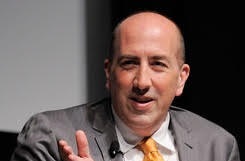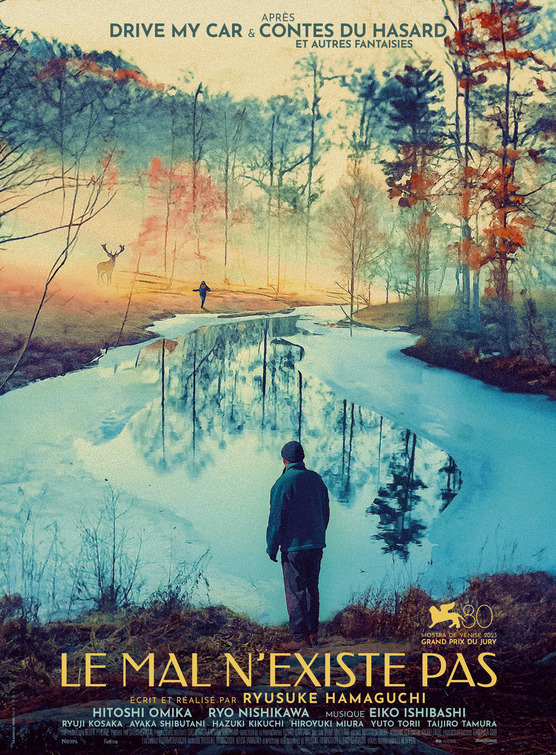“You can’t get a head start if you aim for perfection,” a clueless moneyed entrepreneur muses during a video chat with his two shell-shocked subordinates in the new film from writer-director Ryûsuke Hamaguchi. In the context of the actual conversation the sentiment is even more inane than it sounds on the face of it. And there’s also the question if perfection itself even … exists? The title of this movie seems a definitive statement but it’s ultimately not one that the movie itself really settles. Nevertheless, in its opening scenes, it posits a near-Edenic form of rural life.
The opening shot, which goes on for quite a while, is key. The point of view is that of a pair of eyes looking up from the ground, into the bare branches of a forest’s trees and the clear sky above them. It’s a moving shot. Those who recollect Carl Theodor Dreyer’s “Vampyr,” and the nightmare vision of its protagonist, will remember that this is pretty much the point of view of a person in a coffin, if the person were alive and the coffin had a window in it.
The beautiful and unsettling vision cuts to a view of the happy, productive Takumi, a widower with a lively, smart young daughter. Outside his small and cozy house, he’s chopping wood, and man is he good at it. He’s got two strong reserves of fireplace fuel in orderly stacks. His surroundings are ravishing, and his health is robust (later we’ll see that he, like so many of his countrypersons, is a smoker). Collecting water from a nearby stream, he speaks with a neighbor. They’re residents of a small and very rural village outside Tokyo, a place very nearly completely unspoiled. As they look around the banks of the stream, Takumi, a nature savant, comes upon some wild wasabi. He’ll pick it and bring it to a local restaurant where it’ll flavor a meal he shares with two visitors.
Takumi (Hitoshi Omika) is a little absent-minded, and he worries that he may be late when he remembers he has to pick up Hana from school. When he gets there, we’re treated to another unusual and beguiling shot: the small young children dot the small parking lot as if frozen, and the camera executes a slow lateral dolly as Takumi slowly pulls in. As it happens, they’re just playing a game of red light/green light but the initial vision is of something supernaturally poetic.
Hamaguchi is a fluent filmmaker who’s capable of being very tricky. “Drive My Car,” his 2021 international breakthrough film, a rare Japanese picture to garner not just a Best International Feature Oscar nomination but one for Best Picture as well, was, despite its three-hour length, one of his most narratively conventional pictures. “Evil Does Not Exist” is something different, starting out as a character study cum eco parable and morphing into an enigmatic nightmare. The paradise of Takumi’s village is roiled by the aforementioned entrepreneur, who has bought a parcel of land in the village where he wants to erect a “glamping” resort—and do it on the cheap. His underlings, Takahashi (Ryuji Kosaka) and Mayuzumi (Ayaka Shibutani) hold an outreach meeting with the villagers, where they are, in what is arguably a Japanese tradition, very politely eaten alive by the villagers’ completely right-on and well-informed ecological and community-impact objections.
Their boss, a comedically slick yutz played by Yoshinori Miyata, proposes to the duo that they try to co-opt Takumi. But Takumi’s quiet confidence has convinced the pair that they’re on the wrong side, job or not. In a very funny scene, Takahashi asks to split some of Takumi’s logs, and when he finally “gets” it, practically proclaims himself a new man.
But this tone isn’t where the movie is ultimately going to settle. As it happens, and this is just one possible interpretation, the very idea of upsetting the balance of nature has set nature against the businesspeople and the villagers. This leads to an ending that’s both a puzzler and a gut-punch. And something that admirers of “Drive My Car” who aren’t familiar with other components of Hamaguchi’s filmography might find confounding. If you’re seen, say, the five-hour “Happy Hour” or the doppelganger romance “Asako I & II,” you know that, with this prodigiously gifted filmmaker, you’re best off being ready for anything.




















